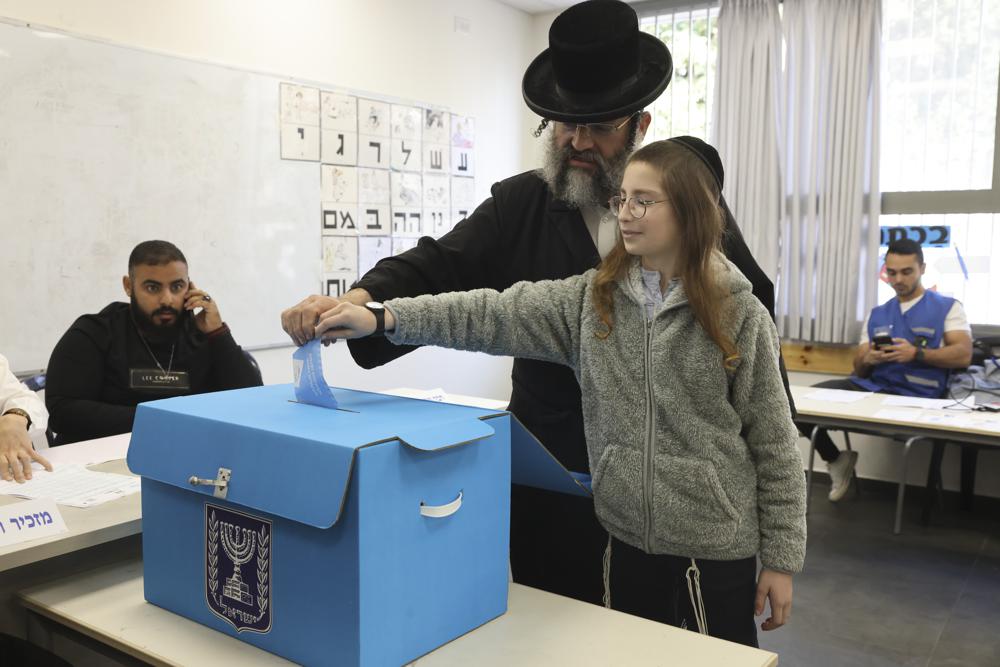FOR the fifth time since 2019, Israelis were voting in national elections on Tuesday, hoping to break the political deadlock that has paralyzed the country for the past three and a half years.
Although the cost of living is surging, Israeli-Palestinian tensions are boiling over and Iran remains a central threat, the foremost issue in the vote once again is former leader Benjamin Netanyahu and his fitness to serve amid corruption charges. His main rival is the man who helped oust him last year, the centrist caretaker Prime Minister Yair Lapid.
“These elections are (a choice) between the future and the past. So go out and vote today for our children’s future, for our country’s future,” Lapid said after voting in the upscale Tel Aviv neighborhood where he lives.
Polls have predicted a similar result: stalemate. But a powerful new player is threatening to shake things up. Itamar Ben-Gvir, a leading far-right politician, has surged in opinion polls recently and will be seeking a harder line against the Palestinians if he helps propel Netanyahu to victory.
After he cast his vote in the West Bank settlement where he lives, Ben-Gvir promised that a vote for his party would bring about a “fully right-wing government” with Netanyahu as prime minister.
With former allies and proteges refusing to sit under him while he is on trial, Netanyahu has been unable to form a viable majority government in the 120-seat Knesset, or parliament.
“I’m a little worried,” Netanyahu said after casting his ballot. “I hope we end the day with a smile.”
Netanyahu’s opponents, an ideologically diverse constellation of parties, are equally hamstrung in cobbling together the 61 seats needed to rule.
That impasse has mired Israel in an unprecedented political crisis that has eroded Israelis’ faith in their democracy, its institutions and their political leaders.
“People are tired of instability, of the fact that the government is not delivering the goods,” said Yohanan Plesner, a former legislator who now heads the Israel Democracy Institute, a Jerusalem think tank.
Election officials said that by noon Tuesday, turnout stood at 28.4%, which is nearly 3% higher than at the same time during last year’s vote.
Buoyed by his followers’ almost cult-like adoration, Netanyahu, 73, has rejected calls to step down by his opponents, who say someone on trial for fraud, breach of trust and accepting bribes cannot govern. Netanyahu denies wrongdoing, but embarrassing details from his ongoing trial repeatedly make front page news.
In Israel’s fragmented politics, no single party has ever won a parliamentary majority, and coalition-building is necessary to govern. Netanyahu’s most likely path to the premiership requires an alliance with extremist ultra-nationalists and religious ultra-Orthodox parties.
These parties would demand key portfolios in a Netanyahu government, and some have promised to enact reforms that could make Netanyahu’s legal woes disappear.
The ultranationalist Religious Zionism party, whose provocative top candidate Ben-Gvir wants to deport Arab legislators and is a disciple of a racist rabbi who was assassinated in 1990, has promised to support legislation that would alter the legal code, weaken the judiciary and could help Netanyahu evade a conviction. Ben-Gvir, promising a tougher line against Palestinian attackers, this week announced he would seek the Cabinet post overseeing the police force.
Critics have sounded the alarm over what they see is a destructive threat to Israel’s democracy.
“If Netanyahu is triumphant,” wrote columnist Sima Kadmon in the Yediot Ahronot daily, “these will be the final days of the state of Israel as we have known it for 75 years.”
Netanyahu’s Likud party has tried to tamp down worries, saying any changes to the legal code won’t apply to Netanyahu’s case and that the extremist elements of his potential coalition will be reined in.
Netanyahu, currently opposition leader, paints himself as the consummate statesman and only leader capable of steering the country through its myriad challenges. Polls say the race is too close to predict.
Netanyahu was ousted last year after 12 years in power by the diverse coalition forged by Lapid, Netanyahu’s main challenger.
The coalition, made up of nationalists who oppose Palestinian statehood, dovish parties that seek a peace agreement, as well as for the first time in the country’s history, a small Arab Islamist party, united over their distaste for Netanyahu but collapsed this spring because of infighting.
The centrist Lapid, a former author and broadcaster who became premier as part of a power-sharing agreement, has portrayed himself as an honest and scandal-free change from the polarizing Netanyahu.
In his short term as caretaker leader, Lapid welcomed President Joe Biden on a successful visit to Israel, led the country in a brief military operation against Gaza militants and signed a diplomatic agreement with Lebanon setting a maritime boundary between the enemy nations.
Still, Lapid’s chances to return to leadership are shaky. He is relying on voters from Israel’s Palestinian minority, who make up one fifth of the population. Their turnout is predicted to reach historic lows, but if they unexpectedly do come out to vote, that could slash the Netanyahu camp’s numbers.
After the votes are tallied, the parties have nearly three months to form a government. If they can’t, Israel will head to yet another election.
“I hope this time it will be final,” said Avi Shlush, a voter in Tel Aviv. “But it will not be final. We are heading to another election.”
AP

